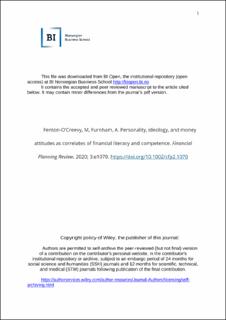Personality, ideology, and money attitudes as correlates of financial literacy and competence
| dc.contributor.author | Fenton-O'Creevy, Mark | |
| dc.contributor.author | Furnham, Adrian | |
| dc.date.accessioned | 2021-09-29T11:14:05Z | |
| dc.date.available | 2021-09-29T11:14:05Z | |
| dc.date.created | 2020-07-14T14:15:09Z | |
| dc.date.issued | 2020 | |
| dc.identifier.citation | Financial Planning Review. 2020, 3 (1), e1070. | en_US |
| dc.identifier.issn | 2573-8615 | |
| dc.identifier.uri | https://hdl.handle.net/11250/2786000 | |
| dc.description.abstract | This study looked at whether demographics, religious beliefs, political orientation, personality traits, and money attitudes are correlates of financial capability, knowledge and distress. Over 3,500 British participants completed multiple measures online. As hypothesized, demographics, religious beliefs, political orientation, personality traits, and money attitudes each explained unique variance in financial capability, financial knowledge, and financial distress. Regression and correlational results showed demographic factors particularly age, education, and income were significantly related to all criteria variables. Money attitudes explained additional variance in financial capability and distress beyond that explained by demography, ideology, and personality. Trait conscientiousness, money as security attitude, age, and income were most strongly correlated with financial capability and financial distress. | en_US |
| dc.language.iso | eng | en_US |
| dc.publisher | Wiley | en_US |
| dc.title | Personality, ideology, and money attitudes as correlates of financial literacy and competence | en_US |
| dc.type | Journal article | en_US |
| dc.type | Peer reviewed | en_US |
| dc.description.version | acceptedVersion | en_US |
| dc.source.pagenumber | 14 | en_US |
| dc.source.volume | 3 | en_US |
| dc.source.journal | Financial Planning Review | en_US |
| dc.source.issue | 1 | en_US |
| dc.identifier.doi | 10.1002/cfp2.1070 | |
| dc.identifier.cristin | 1819395 | |
| dc.source.articlenumber | e1070 | en_US |
| cristin.ispublished | true | |
| cristin.fulltext | postprint | |
| cristin.qualitycode | 1 |
Tilhørende fil(er)
Denne innførselen finnes i følgende samling(er)
-
Scientific articles [2173]
